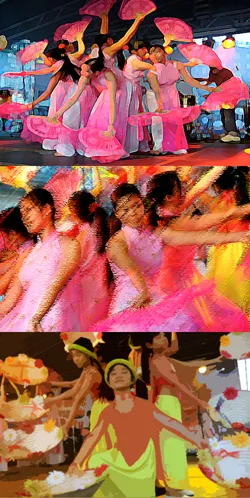Vietnamese community has been present in Warsaw since the 1950s, from which time the number of Vietnamese nationals living in the Polish capital has been steadily increasing. They make up a fairly tightly-knit and well-organized group, perceived by Poles as closed and insulated. The cultural centre of Vietnam is in Warsaw. It is also here, where the Vietnamese pagoda and headquarters of Vietnamese Women's Assosiaction are situated, and where the Vietnamese football league is based. From time to time, the Miss Vietnam beauty pageant is held in Poland, charity concerts of Vietnamese artists in the Congress Hall and cyclic parties in clubs - primarily aimed at Vietnamese, as well as meetings with Vietnamese Buddhists are organised. All of these actions and events, to a greater or lesser extent, promote Vietnamese culture and give opportunities to interact with it. Yet, this opportunity is given only to Vietnamese. The Centre of Vietnamese Culture Thang Long, although set up a good few years ago, is in reality inaccessible for ordinary Warsaw citizens. Firstly, because the average Varsovian has no clue where it is located. Secondly, if he or she succeeds to find it, they will not simply be allowed to enter and see the items on display. Thirdly, even if one has a Vietnamese friend who will call the guardians of the Centre and show him or her around, there will be no one to provide them with comprehensible and reliable information about the exhibits. The Warsaw replica of One Pillar Pagoda, a meeting place for Vietnamese Buddhists, is a magical, seemingly unreal spot on the map of Warsaw Prague district. This unique, colourful piece of Asia in Warsaw is hidden behind a wall and gate. People living in the vicinity, have no idea what a treasure there is, so near their backyards. Thus, the Vietnamese culture, both traditional and modern, though present in Warsaw is invisible, hidden, lurking.
The real ambassadors for Vietnamese culture and art in Warsaw are not Vietnamese, but Poles. A small group of enthusiasts is trying to show what is the most interesting in Vietnam, avoiding exaggerated Cepelia-like air and political context. These two problems, however, not always can be shunned. People from the ARTERIA Art Foundation and portal Continent Warsaw constitute just a handful of people who want to show to Varsovians, what Vietnam is. Arteria noticed how important the presence of Vietnamese in Warsaw was and, for nearly five years now, have been organizing artistic activities to familiarise Poles with Vietnam. Continent Warsaw promoting multiculturalism in Warsaw, never forgets about the largest foreign community in the capital of Poland. The Wiet Nam game, Festival of Vietnamese Films "Cinema in Five Flavours," Travel to Asia or Vietnamese New Year in Saturator are significant artistic and cultural happenings noted by the people living in Warsaw, but which were organised mainly by Poles, not Vietnamese.
There are isolated cases of Vietnamese willing to support events promoting culture of their homeland among Poles; those actively contributing to the so-called "culture" can be counted on the fingers of one hand. There are too few Vietnamese that would have a plan, an idea, and desire to effectively and originally promote Vietnam in Poland. Volunteers are missing, because engagement in this type of activities is nothing near as lucrative as working in the trade; it does not ensure the respect and support of other Vietnamese (for the success worth appreciating among them is defined primarily as financial success). Furthermore, the specificity of the cooperation with Vietnamese does not suit many people. The older generation brought up in Vietnam does not understand the mechanisms and ideas in contemporary art and cultural animation. Therefore, the Vietnam people know in Warsaw, is the Vietnam of Poles who visited it. And it is widely known that a story told by intermediary seems to be out of touch with reality; moreover, not every traveler is able to understand what he or she witnesses.
There is no idea on the horizon which could help the Vietnamese to engage themselves in promotion of their culture. The Vietnamese born and raised in Poland, lose contact with their parents' homeland. As for the young people who still maintain the bond, it is difficult to say whether they are tired of being forever asked questions about Vietnam, just a little bit ashamed of their background, or whether they do not know how to talk about it. Poles' ideas are gradually becoming depleted – already, there are not many good Vietnamese movies one could show, the puppet water-theatre organise somewhere their mini-performances twice a year, while the model of Sino-Vietnamese dragon is slowly falling apart. We felt a breath of fresh air when unexpectedly the promotion, although unplanned, of Vietnamese bars at the Stadium succeeded. The charm of this bazaar, a "little Saigon" indeed, has inspired artists and filmmakers; stories with Vietnamese in the foreground appeared in Polish cinemas. Will the slow death of the 10th-Anniversary Stadium also mean the exhaustion of the topic for those who are here, in Warsaw, and want to talk about Vietnamese? Will the day come, when Vietnamese snatch at a microphone held by a white man and begin to talk about themselves? And, will there be anyone wanting to listen to them then?
Text by Đàm Vân Anh
Translated by Pola Rutkowska












